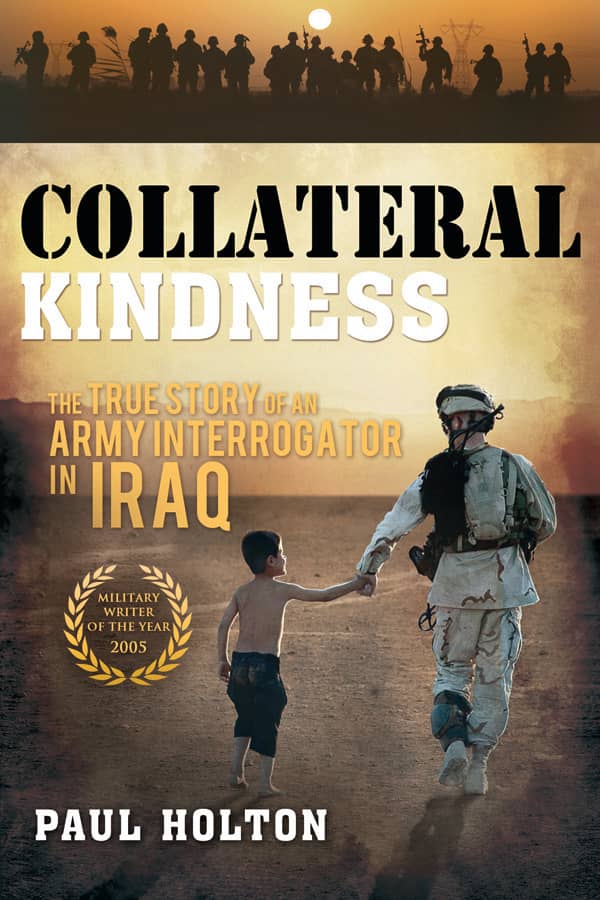Army Intelligence Officer Pens Open Letter on Iraq and ISIS
OutdoorHub 08.26.14

Chief Warrant Officer Paul Holton, author of “Collateral Kindness: The True Story of an Army Interrogator in Iraq,” penned an open letter to the Administration and American
people about the situation in Iraq.
“Dashed hopes of the Iraqi people:
Why did we leave them so unsecured and unprotected?
As disturbing news reports continue to flow out of Iraq regarding the current situation there, I can’t help but remember the faces of all the people I met and worked with on my last deployment. Flashbacks of all the wonderful times and miraculous events there fill my head as I think of how encouraged we were for their future. With our efforts to build community, establish small businesses, provide training and education, and maintain security, there was a real feeling of hope for a brighter future for Iraq and its people.
After many years of fighting, hundreds of lives lost and countless hours working to build a new democratic Iraq, for the first time we, as American soldiers, started to see the positive results of our efforts and sacrifices. I for one, after three deployments there, started to believe again that just maybe it was all worth it. There was hope, and you could see it in the people’s eyes.
But since our complete withdrawal from Iraq, this has all but been dashed by the rise of Sunni extremist militants, referred to as ISIS (or DA’ASH, as it is called by many Iraqis), who filled the vacuum left by our departure. The Sunni extremists, ousted by the Iran-backed Shiite government, began their own fight to set up an Islamic State, the caliphate, in the northern part of Iraq and western Syria. The insurgents have taken control of the city of Mosul, the very city I lived in for almost one year, and are fighting against Iraqi forces and Peshmerga Kurdish forces on all fronts. And as it is with most conflicts, the innocent civilians end up suffering the most.
I continue to receive disturbing emails from close friends in the surrounding areas of ongoing pain and suffering. Friends from the religious minorities in al-Hamdaniya, such as the Christians, the Chaldo-Assyrians, the Yazidis and the Shabaks, have all been attacked, systematically killed, displaced and threatened by the Sunni extremists.
Two of my closest friends the Sheikhs, (as I referred to them), who I worked with on many community events, were targeted by the ISIS and forced to flee their homes with their families and move deeper within the more secure Kurdish territory near Irbil. I later received reports that their homes were bombed and destroyed, along with everything else they owned.
I received this email from an Iraqi General I worked closely with in Mosul,
‘Come back to Iraq to repair the largest possible number of bad things that happened after the liberation of Iraq, and the Iraqi government who receives its orders from Iran … there are armed ISIS militias killing people and destroying homes and imprisoning citizens without any crime …
‘There has been considerable havoc in the country and U.S. are the cause of your troops … who opened the way for Iran and the ISIS militias to enter and destroy Iraq … is not the liberation of Iraq, but Iraq has been destroyed ….
‘Most of the former army officers, doctors, engineers and scientists have all escaped out of Iraq, because they are afraid for themselves. Yet continue daily operations of the assassination by al-Qaeda and ISIS Da’ash…’
As the fighting rages on and more and more innocent civilians suffer and die, one can’t help but think about what we could have done or should have done differently to prevent this terrible tragedy from happening.
Many questions need to be answered.
Knowing the long-lasting historical tension and conflict that exists between the Shiites, the Sunnis and the Kurds, why didn’t we force the Iraqi government to be equally split between the three groups, so each group could have proper representation? Why didn’t we leave a security force in place to maintain peace and the status quo? Why did we leave them so unsecured and unprotected? Surely, we thought this would happen, didn’t we? We can’t lose everything we gained, after all our efforts and all the lives lost, can we? Surely our smart people in Washington thought of all of this, right? What are we going to do now? How much of what we gained will now be lost? How much collateral damage will there be before we do something to stop it?” –Chief Wiggles
About “Collateral Kindness”
“Collateral Kindness” is the gripping, heartwarming story of U.S. Army interrogator Paul Holton’s soul-searching personal battles during Operation Iraqi Freedom. Every day, Paul faced down his enemies, but when he had to face a suffering Iraqi child behind a barbed-wire fence, his life changed. This fascinating account from the front lines illustrates the simple truth that kindness can heal even the deepest wounds.
Contact:
Rodney Fife
(801) 489 4084
Rfife@Cedarfort.com

